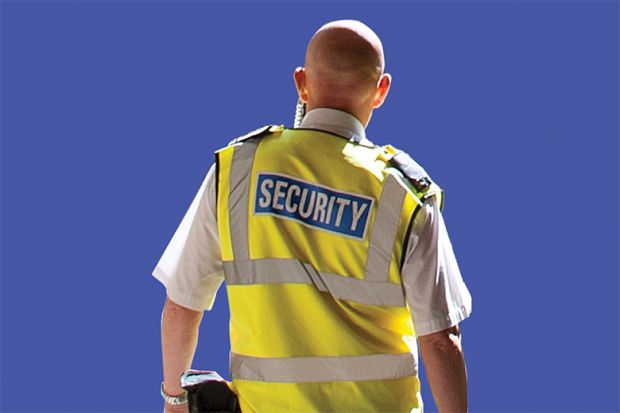Like everyone else who’s been going in to work during the lockdown, we in campus security didn’t see the news that restrictions were being eased as that big a deal. If anything, the announcement was tinged with sadness. No more patrolling peaceful, empty office blocks, undisturbed by anything but the occasional packet of expired biscuits.
With academic staff working from home and most students having left, the last three months has felt like a hundred Sundays back to back. Our biggest challenge has been reassuring the last remaining freshers and trying to look after the buildings: we’ve been fending off rough sleepers intent on bedding down in our empty student halls and stopping teenagers from climbing the scaffolding on our mothballed construction site (presumably as part of their daily exercise ration).
Guards displaying Covid-19 symptoms have self-isolated, and others – such as those who look after Mum and Dad – rightly went into shielding. But on my shift we’re three blokes with no recurring coughs who all live within dashing distance of the campus (as a previous boss once told us, you’re only allowed to go off-duty if you’re certain you’ve seen the asteroid).
So I was puzzled when two of my mates recently texted to tell me I was going to die. At first, I thought it was a joke. After all, security staff like a prank. I still fondly recall the time two night guards spiked their workmate’s Red Bull with several five-hour energy shots and he ended up raving to the shipping forecast.
But then I read the article my mates were linking to. According to the UK’s Office for National Statistics, male security guards are the group most at risk of dying from Covid-19. I showed my supervisor; we took a moment to digest the news, then photoshopped a poster for The Expendables movie, adding the names of those on our shift above the fixed stares of the action stars. I’m Jason Statham, possibly because we’re both into tunes by The Shamen (one of Statham’s early roles was as a topless dancer in their Comin’ On video).
I do wonder why our death rate – reported in May as 45.7 per 100,000 – is higher than that of other groups on campus: the student nurses, the forensics officers, the medical researchers. We touch a lot of locks, I suppose, and have recently been taking receipt of many accommodation keys from departing students. We also have to handle the staff parcels, which arrive via multiple couriers each day (a few academics will be coming back to some very fluffy Graze lunch boxes).
Whenever we can’t social distance outside our control room, we try to wear masks. This doesn’t always happen, though: they’re a twelfth thing to remember to hook to our uniforms, after phone, keys, torch, radio, body cam, access card, personal pen, notebook, gloves, sanitiser and portable first-aid kit. Plus, we have been conscious that they were in short supply; maybe that’s why so few students seem to wear one.
University staff, on the other hand, are more consistent in their precautions. Some have been visiting campus to sign out swivel chairs after their home sofas were identified as postural health hazards. And office team leaders, whose dialogue with us would usually go no deeper than the weather, can now be found standing at our two-metre line for hours, pouring out their thoughts. It’s like being a barman. People seemingly want a fresh face to unload to after a dozen-plus weeks with their family.
Our 24-hour booth has also become a lighthouse for the people who used to shout in parks. We recently had to calm down a local stoner who was convinced his pet raven had jumped over our fence.
Sadly, his visit did not coincide with that of the local ambulance service, who needed to collect personal protective equipment from our nursing simulation suite. A workmate and I walked around the plastic cadavers collecting gloves and all the sanitiser we could see. Sadly, the only thing I could find to carry them in was a yellow biohazard bag. This, combined with the dust mask I’ve been wearing from my toolkit, got me some odd looks as I walked back across the city.
The university estates team have been with us on weekdays, preparing for the September intake. They’re marking out corridors for one-way foot traffic and sealing off the middle urinal in male toilets with parcel tape. Drop boxes have been set up close to the library so that returned books can be quarantined.
Towards the end of a recent shift, the security manager phoned us to say there was a confirmed case of coronavirus within the team. When she hung up, I looked at my reflection in the screen.
I’m low-skilled, according to Fiona Bruce, the BBC newsreader who delivered the news about the death rate among manual workers (prompting numerous complaints). Maybe if I’d focused more at school or been better at schmoozing, I could’ve led a high-skilled life and earned a packet.
But I’m glad I didn’t – for two reasons. First, because anyone at the university on more than £30,000 is taking a 20 per cent pay cut, in line with the vice-chancellor. And, second, because if I’d been locked up in an office, I’d never have learned that you can dance to the shipping forecast.
George Bass is a security guard at a UK university.





